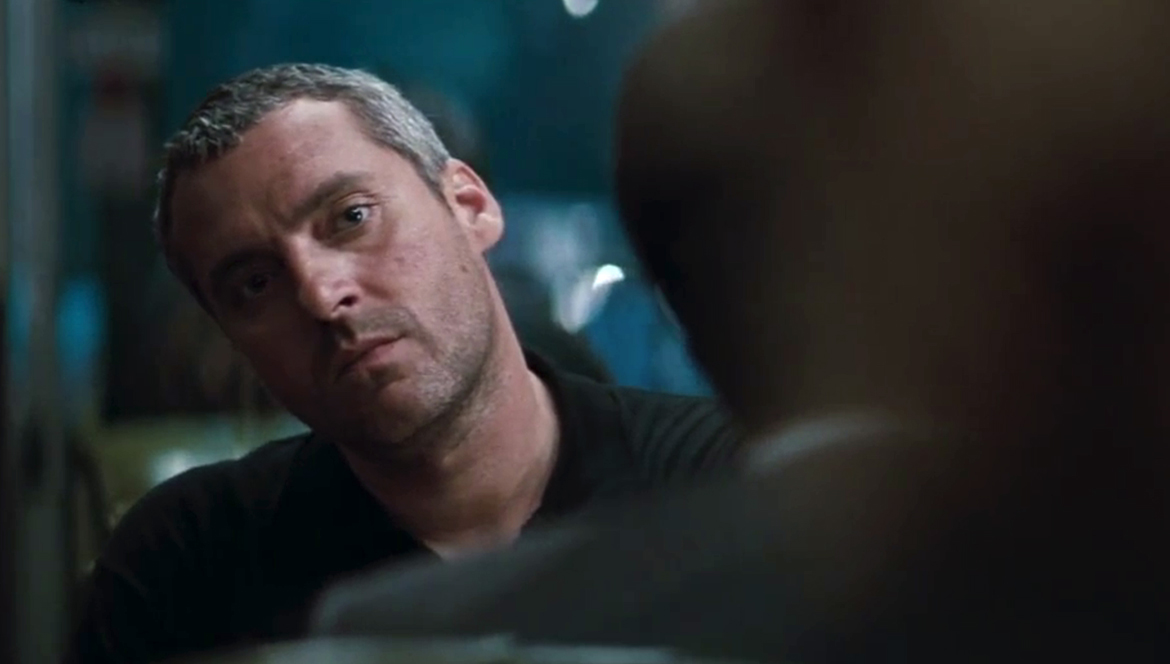Let’s just talk about the scene. It’s a great one after all and it typifies all the best things about Tom Sizemore as an actor or presence. The film is 1995's Heat, an epic cops-and-robbers crime saga, directed by Michael Mann. If you know the movie, and you care about Sizemore, then you know the scene. The crew is all together, meeting in secret in the outskirts of Los Angeles: It's Sizemore, Val Kilmer, and Danny Trejo, with Robert De Niro calling the shots. De Niro holds court in the way he always does, but then he gets to Sizemore's character, telling him essentially that he should quit now, not go on this one last score. He's got a wife that takes care of him and apparently a healthy investment portfolio that for some reason De Niro knows all about. Sizemore gets his close up and he's doing so many interesting things in the frame: the dead-eyed, mouth slightly agape stare, the heavy blinking, the gambler's antsy manner, and eventual devilish smirk. De Niro is giving him the De Niro face, and Sizemore is right there with him, unwavering, and then he says the line.
Sizemore brought these moments to every movie he was in. Some could argue they were bad, others could argue they were good, but they were inarguably always memorable. Sizemore, who died Friday at 61 from a brain aneurysm caused by a stroke, was a true character actor. The guy in the margins who'd never draw you to see a certain movie, but whose presence always made that movie just a little bit better. He's a first-ballot character actor hall-of-famer. In each of the movies he was in, he brought a reality, a grittiness, sometimes a sweaty grossness to things. He felt like a person you might actually meet in some sketchy punk club or in a rat-infested motel or in the front lines of a brutal war. The only thing Hollywood about him really were those piercing eyes that could look right through and convince you of his edge.
Consider the moment in Steven Spielberg's Saving Private Ryan, when the crew is falling apart during their mission and Sizemore pulls out a gun to threaten one of the insubordinate soldiers. You look at the almost sociopathic glint in his eyes and believe that he might actually shoot this guy even if it makes no sense for the actual story of the movie. That's not a thing to teach; you can either bring it or you can't. Despite what people believe good acting to be, it's intensity and passion that suck you into a moment or a scene, and he brought both in equal spades.
Even when he was ridiculous, he was no less magnetic. In Kathryn Bigelow's unheralded Strange Days, he dons one of the goofiest wigs you've ever seen and tries to play mellow pal to Ralph Fiennes, an attitude that does not suit him. It's pretty obvious that a heel turn is coming, but it doesn't make it any less exciting when it finally happens. The movie jumps up a few notches when he goes full bad guy-mode. He's right in his element, speaking in a gravelly whisper and full of twitchy, itching, murderous energy. Sizemore was great because he knew how to ham it up in quiet and loud ways.
Sizemore was effective in crime and action movies, particularly war movies, a go-to for guys like Ridley Scott and Michael Bay whenever they needed effective grunts to make the most of any five-minute scene between explosions and gunfire. It's not that he couldn't bring something worthwhile to other kinds of movies, but he knew where his bread was buttered and he had mostly good taste with his role selections. His gritty authenticity and unrestrained manner kicked up the tension in all these movies, and it's an energy sorely missing in many films today.
We also need that level of insanity too. He was great at scenery chewing and possessing a downright psychotic outlandishness. That's pretty much what he's doing throughout all of Oliver Stone's Natural Born Killers, particularly with Juliette Lewis (another hall-of-famer); he brings it to his brief turn in Twin Peaks: The Return; and he even gets it out in a memorable cameo in Bigelow's Point Break.
The movies miss a Tom Sizemore-type actor in them, but some things just pass through like a comet across the sky. They can't be recreated, only admired.






